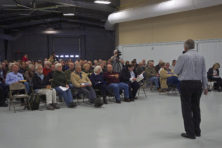Mystery Surrounds Governor’s Biogas Announcement
- Share
- Tweet
- Pin
- Share

An air of mystery surrounded Gov. Scott Walker’s Nov. 17 visit to Heritage Farm in Kewaunee.
Robert Weidner, chair of the Kewaunee County Board, was informed that the governor was visiting but was not told why.
“I knew it was ag-related, but that’s all they told me,” he said.
“It was kind of shrouded in secrecy,” said Rep. Joel Kitchens. “They didn’t even tell me what it was about. They just said they have an announcement.”
In his surprise visit, Walker announced that he had requested the Public Service Commission (PSC), the Department of Natural Resources (DNR) and the Department of Agriculture, Trade and Consumer Protection (DATCP) to collaborate on recommendations by Dec. 1 that, according to a press release from the Governor’s office, “propose a tangible private sector response linking the application of digester technology to environmentally sensitive areas of Wisconsin, specifically areas with high concentrations of dairy cattle. A Request for Proposal (RFP) laying the groundwork for actionable items should be ready to release publically [sic] in January.”
The county had already been awarded a $60,000 grant from the PSC to conduct a feasibility study for a countywide biogas system that would produce biogas from the 650 million gallons of manure produced annually by Kewaunee County’s 95,000 cows. That report, called Project Phoenix (available on the Kewaunee County website, kewauneeco.org), was delivered at the end of June and it details a countywide biogas system for all farms with more than 200 cows.

“They made a determination that it’s feasible in the economic sense, but they didn’t cover all the other issues – like siting and right of ways and acceptance by the community, which is a big issue, all the possible side effects,” Weidner said of the report.
What the RFP will call for remains a mystery. When the Pulse asked Gov. Walker spokesman Tom Evenson for clarification on the RFP, he said, “This proposal would be a significant state investment for the area. Governor Walker believes in protecting and improving our natural resources. This is yet another tool the state has at its disposal that can provide water quality benefits, promote renewable energy in a common sense way, and preserve our agricultural heritage.”
A request for clarification to the PSC netted a response that the subject was tentatively scheduled for discussion at the Dec. 1 open meeting of the PSC [the day after this issue went to press].
“Is it going to be for a very comprehensive environmental and economic impact study?” asked Kewaunee County Supervisor Lee Luft, who serves on both the Groundwater Task Force and the Land and Water Conservation Committee. “Is it for furthering the four weeks of study that has already been done to really understand what all the implications of such an installation would be [he refers to the Phoenix Project report]? Is it to build an actual installation? We don’t know. So that’s a big, big unknown. The work is proceeding without the input of any elected officials within the county and even our state representative. It’s concerning. If we’re looking at something that’s a major project to be placed in our midst, I guess we’d like a little more detail than we’ve had to date.”
Luft is specifically concerned about problems that have been identified at other biogas facilities, such as the odors generated by the Heartland Biogas Plant in Greeley, Colo. A county commissioner there recently called for the plant to be shut down until the problem is rectified.
“For the past eight weeks or so, I’ve been bringing in reports and studies on this,” Luft said. “It is disturbing. People are literally becoming sickened who live anywhere near this manure-fed biogas plant.”
But Luft points out that he is not against the project.
“If the technology is proven and if it can successfully meet all the promises, I’m going to be on board with that because we need help. We need the clean water. We need to find a way to treat the hundreds of millions of gallons of liquid manure that is currently being spread. But I don’t want to see an installation come to the county that has had the same very negative impacts that is in Weld County, Colo. We all want the same things for our citizens. I’ve heard people say, well, if this is what we need to do. That’s fine, but let’s make sure whatever choices we make, we’re not exacerbating an already difficult situation.”
“I think there’s a little bit of anxiety because there is so little information. They may perceive this is moving along pretty fast, but any $10 to $20 million job takes months and years of planning,” Weidner said. “Nothing’s going to happen until a lot of things are done and a lot of things are revealed. A lot of study has to be done. If it was a county project, which it is not, we’d talk two to four years on planning and construction. So I don’t see that people should get too nervous about it. I know some people are saying negative things about the project because they’re afraid of what it may turn into, which none of us know.”
Weidner also points out that although the project appears to be out of local hands at the moment, locals will absolutely have a voice in the project.
“Our involvement is to make sure the siting and the process and the environmental issues are satisfied before we sign off on anything,” he said. “I don’t know that we can make it happen, but we certainly can stop it or obstruct it or reroute it if it’s going astray on us. We can make it harder if they don’t do all the things we want.”

